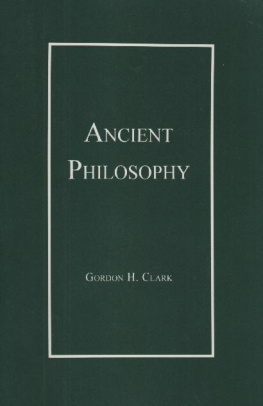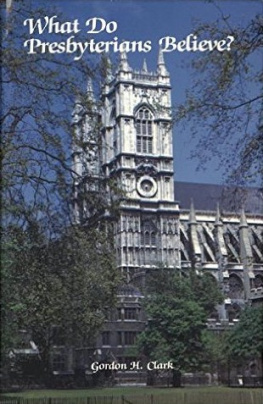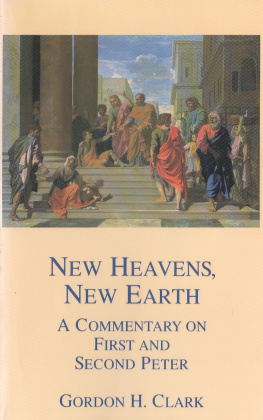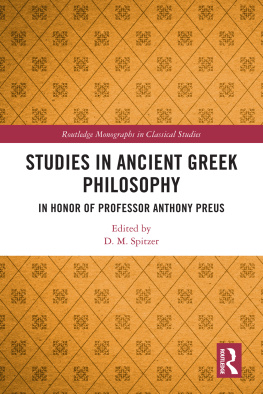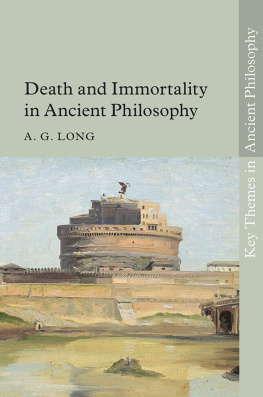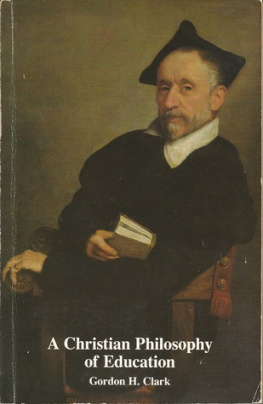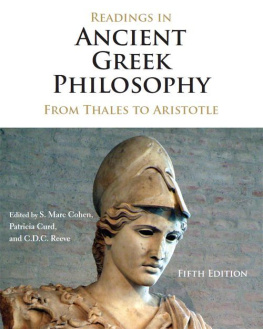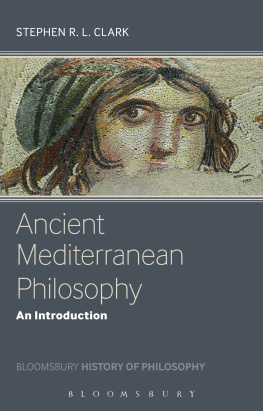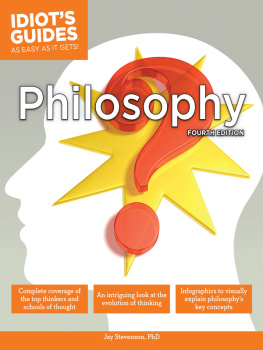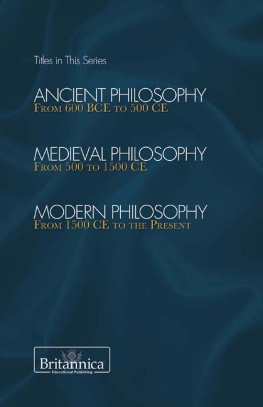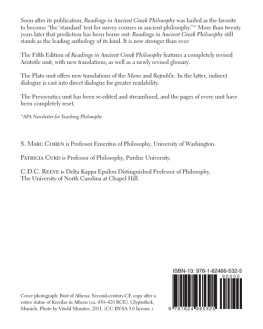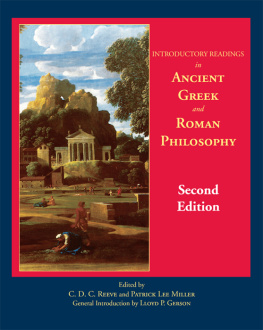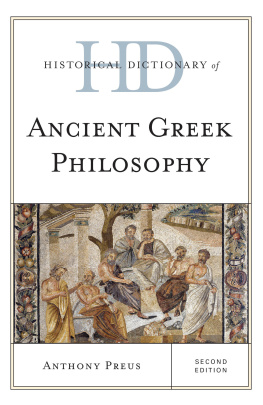Gordon Haddon Clark - Ancient philosophy
Here you can read online Gordon Haddon Clark - Ancient philosophy full text of the book (entire story) in english for free. Download pdf and epub, get meaning, cover and reviews about this ebook. year: 1997, publisher: Trinity Foundation, genre: Science. Description of the work, (preface) as well as reviews are available. Best literature library LitArk.com created for fans of good reading and offers a wide selection of genres:
Romance novel
Science fiction
Adventure
Detective
Science
History
Home and family
Prose
Art
Politics
Computer
Non-fiction
Religion
Business
Children
Humor
Choose a favorite category and find really read worthwhile books. Enjoy immersion in the world of imagination, feel the emotions of the characters or learn something new for yourself, make an fascinating discovery.
- Book:Ancient philosophy
- Author:
- Publisher:Trinity Foundation
- Genre:
- Year:1997
- Rating:4 / 5
- Favourites:Add to favourites
- Your mark:
- 80
- 1
- 2
- 3
- 4
- 5
Ancient philosophy: summary, description and annotation
We offer to read an annotation, description, summary or preface (depends on what the author of the book "Ancient philosophy" wrote himself). If you haven't found the necessary information about the book — write in the comments, we will try to find it.
Ancient philosophy — read online for free the complete book (whole text) full work
Below is the text of the book, divided by pages. System saving the place of the last page read, allows you to conveniently read the book "Ancient philosophy" online for free, without having to search again every time where you left off. Put a bookmark, and you can go to the page where you finished reading at any time.
Font size:
Interval:
Bookmark:
Leon Robin, Greek Thought and the Origins of the Scientific Spirit (New York: Alfred A. Knopf, 1928), 54.
John Burnet, Early Greek Philosophy (New York: The Macmillan Company), second edition, 121.
Greek thought tended to subsume all sorts of change under the category of motion (). Aristotle was only giving systematic formulation to this point of view when, in his Physics, he distinguished four kinds of motion: (1) qualitative motion-the procession of qualities in things; (2) quantitative motion-growth and diminution; (3) substantial motion-birth and death; and (4) locomotion-motion in the more restricted sense of change of place.
Sextus Empiricus, Adversos Mathematicos, vii 127ff. Quoted in J. Adam, The Vitality of Platonism (Cambridge University Press, The Macmillan Company), 89f.
This and following passages from De rerum natura are quoted from the translation of Cyril Bailey.
Essay Concerning Human Understanding, Book II, Chapter xxiii, Section 11.
As late as 1690, John Locke, the empiricist, wrote: It is impossible to conceive that body should operate upon what it does not touch (which is all one as to imagine it can operate where it is not). Later Newtons Principia led him to acknowledge that it is too bold a presumption to limit Gods power on this point by my narrow conceptions. Compare Lockes Essay Concerning Human Understanding, first edition, Book II, Chapter viii, Section 11, and his letter to Stillingfleet (1699).
De rerum natura, IV, 11.
Dererum natura, IV, 11. Baileys translation slightly modified; italics my own.
Republic , 475d, e.
From the Loeb Classical Library.
Gorgias, 514. From the Loeb Classical Library. 1 Alcibiades, 111b. From the Loeb Classical Library.
I Alcibiades, 117a. From the Loeb Classical Library, t From the Loeb Classical Library.
Meno, 86b. From the Loeb Classical Library.
Phaedo, 961-999d. From the Loeb Classical Library.
Phaedo, 75c-3. From the Loeb Classical Library.
Republic, 508-509.
Timaeus, 48e-51c. From the Loeb Classical Library.
Compare Phaedo, 75c.
Physics, Book III, 194b 16-23
Physics, Book V, 197a5-8.
1048a30-b6.
Physics, VIII, 10, 267b6.
De Anima, III, 5, 430a 17-25.
Usually translated substance; the word reality may cause less confusion.
Cicero, Academics, II, xlvii.
Enneads, III, vii, 1.
The Philosophy of Plotinus (New York: Longmans, 1929), Volume II, 39.
V, ix, 7. MacKennas translation..
V, ix, 14.
V, vii; V, ix, 12; VI, iv, 4, 10, 14.
VI, iv, 7.
Compare Edgar A. Singer, Jr., On the Contented Life: Old Magic and New Art (New York: Holt, 1936).
VI, iv, 7.
From Zondervans Pictorial Encyclopedia of the Bible (Merrill C. Tenney, editor), 1975.
DeAnima, III, 5, 430al7-25.
Posterior Analytics, I, 9, 76a26.
Physics, VIII 10, 267b6.
From A History of Philosophical Systems, Vergilius Fern, ed. New York: The Philosophical Library, 1950.
From A History of Philosophical Systems, Vergilius Ferm, ed. New York: The Philosophical Library, 1950.
The New Scholasticism, October 1934.
Page 86. Page numbers, unless otherwise indicated, shall refer to the Commentary.
De gen, an., Ill 2, 753b22 and 9, 758b4; Depart, an., II 6, 652a8 and 7, 652b32.
De caelo, III 5, 303bl2; De gen. et corr., II 5, 332a25.
De caelo, IV 4, 312al2 and 3, 310M0; Phys., Ill 7, 207bl and VIII 2, 253al3. With respect to this last reference, the Latin text Thomas uses reads continens but in the comments he says, continens, id est aer et ulterius corpus caeleste. Is this based on an Ionic tradition?
Page 155.
Pages 93, 94.
Page 110.
Page 111.
The Aristotelian testimony to the relation between Socrates and Plato-of which problem the dialogue Timaeus is but a moment-is of utmost importance. In Varia Socratica, page 41, Taylor holds that all Aristotles information about Socrates comes from the dialogues, and hence apparently nothing comes from conversations with Plato himself. Therefore Taylor, and Burnet also, put great faith in the doubtful disjunction, either the Platonic Socrates is historical in every philosophical particular, or else we have none but a cloudy knowledge of the actual person. In the same work, pages 63-89, Taylor fails to do justice, in his explanation of Meta. M., 1078bll, 12, and 30, to the significant summary of lines 27 and 28 where Aristotle is apparently giving his mature and reflected judgment on Socrates position in the history of philosophy. For further material see, Sure une Hypothfcse Recente Relative Socrate, by Leon Robin, in Revue des Etudes Grecques (XXIX, 1916), pages 129ff.
Compare also the admissions on pages 190 and 191, with respect to time.
Pages 114, 115.
Page 130.
Pages 131, 132.
Page 118n2.
Page 115.
Page 114n5; pages 110, 111. We should like to point out that even if Aristotle did misunderstand the word it still remains true that the text of De anima, 404b16-22 suggests, first in bl6, , and second in bl 8, .. ., that Plato and the Timaeus are not to be separated into two different centuries.
Page 111.
Timaeus, 39e8; Ldon Robin, Thiorie Platonicienne etc., pages 304-306.
Pages 209-212. Laws, VII 822a, and Epinomis, 987b9.
Timaeus, 45c2-d6, page 278.
Page 335.
Page 112; compare Taylors Varia Socratica.
See a previous note. Later on, page 445, Taylor strangely seems to admit that th ePhaedo, Gorgias, Republic , and Philebus give us a true view of the theories of Plato himself.
Compare V. Brochard, Les Lois de Platon et la Th^orie des ktees, AnneePhilosophique, XIII, 1902.
Page 339.
Pages 371, 372 (italics mine).
Page 632.
Page 100.
Page 227.
Page 140.
Page 190.
Page 212.
Page 270.
Page 313.
Page 325.
Page 151.
Pages 169-171.
Laws, VII 821e-822b. Epinomis 987b.
Page 170nl.
Pages 170, 171.
Taylor admits, page 32, that the Sophist presents a more advanced doctrine than the Timaeus, but of course explains it differently.
Laws, VII 821e.
Platonism, pages 106ff.
Burnets reference to Theophrastus is beside the present point and Theophrastus too implies a change of opinion on Platos part, which, on Taylors principles, Aristotle would have been sure to mention.
Page 227.
Page 231.
Philosophic der Grecs, II, 1, page 808, Anm. 2.
50. Pages 611-616.
A thesis in philosophy presented to the Faculty of the Graduate School of the University of Pennsylvania in partial fulfillment of the requirements for the degree of Doctor of Philosophy, Philadelphia, 1929.
yaiq , , ' Slav, , , .
.
.
After quoting the lines found also in 404bl iff., see page 11 above. Hippolytus continues, , , .
Histoire de la Psychologie des Grecs, I, 85.
, . , ' .
, .
De Sens. ' , ...
Compare note on page 355.
. ' ' , ; , , ' ; ( ; ; , , .
. , , , .
, . f .
' .
., , , , , ..
The New Scholasticism, January 1934.
It is unfortunate that the Oxford translation does not use luck for , because the two are more nearly colloquial parallels. For example, in English we say good luck but not good chance.
Robin, L., La Pensie Greque, page 349; Hamelin O., Systeme DAristote, page 267; VJQxner-Aristote et VIdealisme Platonicien, page 115, La necessite materielle nest autre que le hasard and page 116n3, and page 117nl,-seem to imply as much without explicitly making the affirmation. I have not found any definite statement in Zeller.
Hermes (1875), page 465.
De anima, liber alter, , Bruns, page 178, 25-26.
For example, D. D. Heath, Misconceptions of Aristotles Doctrine, Journal of Philology (Vol. VII), points out such in Mill and Grote, but is himself, as I conceive, somewhat in the same fault.
Font size:
Interval:
Bookmark:
Similar books «Ancient philosophy»
Look at similar books to Ancient philosophy. We have selected literature similar in name and meaning in the hope of providing readers with more options to find new, interesting, not yet read works.
Discussion, reviews of the book Ancient philosophy and just readers' own opinions. Leave your comments, write what you think about the work, its meaning or the main characters. Specify what exactly you liked and what you didn't like, and why you think so.

